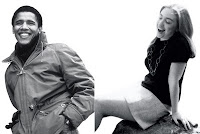 Now more than ever, Americans love leaders who seem to validate their way of life. . . The Obama campaign raised it to an art form, convincing voters that by merely supporting his candidacy, they were proving themselves cosmopolitan and young-at-heart, multicultural and hip. In a sense, [Glenn] Beck’s “Restoring Honor” was like an Obama rally through the looking glass. It was a long festival of affirmation for middle-class white Christians — square, earnest, patriotic and religious. If a speaker had suddenly burst out with an Obama-esque “we are the ones we’ve been waiting for,” the message would have fit right in. [emphasis added]
Now more than ever, Americans love leaders who seem to validate their way of life. . . The Obama campaign raised it to an art form, convincing voters that by merely supporting his candidacy, they were proving themselves cosmopolitan and young-at-heart, multicultural and hip. In a sense, [Glenn] Beck’s “Restoring Honor” was like an Obama rally through the looking glass. It was a long festival of affirmation for middle-class white Christians — square, earnest, patriotic and religious. If a speaker had suddenly burst out with an Obama-esque “we are the ones we’ve been waiting for,” the message would have fit right in. [emphasis added]--Ross Douthat, New York Times, 8.29.10
I listened to Chris Wallace’s interview of Glenn Beck yesterday. Two qualities make Beck—for me—harder to dislike. First, he backs up his a-political claims with references to Republican failures. And second, he is humble in both substance and style. He says he’s engaged in an ongoing search for the truth, and happily welcomes criticism along the way.
I think the search for truth goes with belief in God, or a higher power. There is so much we don't know. Christianity developed during the Roman Empire, when emperors were gods, life was cheap, and most were slaves. Christianity taught followers to value themselves and every human, even outcasts. Though Christians professed no interest in politics, the Romans routinely executed them because they would die rather than accept the emperor as a god. The empire ruled; Christianity was a counter-culture that grew as it was oppressed.
That all changed with Constantine’s conversion to Christianity in 311. The church linked itself to imperial rule for the next 1,200 years, and made itself the faith of kings as Protestantism emerged in the 16th and 17th centuries. But when the American Revolution vested power in the people to overthrow rule by a British monarch, it did so with explicit references to God’s valuing all his children equally. From the beginning, Christianity underpinned American democracy.
We are now led by an intellectual elite that believes science has replaced God. That’s the lesson of “Inherit the Wind” (1960) about how in the 1925 Scopes trial, Charles Darwin finally overcame the Bible. Science is a full-time search for the truth. True scientists are humble in the face of the unknown, just as Christians are.
Our liberal elite is not humble, however, about believing progress moves from superstition, to organized religion, finally to science, where we are today. The American elite honors academic achievement represented by science and teaching, expressed through a meritocracy open to everyone, measured by intellectual accomplishment. Liberals feel, by merit, entitled to rule. Still, they need enough votes from those below to stay in power, and fear uneducated masses will succumb to the siren calls of capitalists, a traditional elite corrupted by money that uses the Republican party, race and religion to snatch needed votes away.
Our liberal ruling class enjoys a rich, expanding culture of new ideas, arts, and entertainment. It seems generous, sincerely believing in its (politically profitable) obligation to help the less fortunate—while keeping its hierarchy in place. Since liberals top the brain hierarchy, since virtually the entire intelligentsia is together in the Democratic Party, it’s almost impossible for intellectuals to view Republicans and their mass supporters as anything but inferiors—bigots, racists, religious wingnuts.
Beck’s rally may indeed represent a largely white following uncomfortable with if not downright hostile to what Douthat calls “cosmopolitan and young-at-heart, multicultural and hip”—also arrogant—America. I think liberals are right to worry about the whiteness of the opposition they have generated. Race can be a powerful divider, and Obama’s open intellectualism does combine with his race to make him less attractive to non-intellectual whites.
If race does divide America, whites remain the biggest. But the size of Beck’s rally still topped any rational expectation. I think it’s because millions of whites who don’t like Obama are fed up with being called racists. Hundreds of thousands of them warmed to the irony of coming together to honor old-fashioned patriotism and America’s Judeo-Christian tradition on the very date and spot of Martin Luther King, Jr.’s “I have a dream” speech. After all, that was when the Rev. Dr. King asked America to judge people by the content of their character, not the color of their skin—exactly the America that Beck’s crowd seeks.
In 2010, it's Democrats who play the race card to gain and hold (minority and liberal white) votes.












